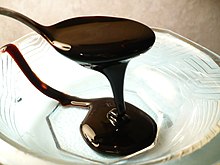**Molasses Production and Types**:
– Etymology: The word ‘molasses’ is derived from ‘melaço’ in Portuguese, intensifying ‘mel’ (honey) with Latinate roots.
– Cognates: Similar terms in other languages include Ancient Greek μέλι (méli), Latin mel, Spanish melaza, Romanian miere melasă, and French mélasse.
– Sugar Cane Molasses: Produced by boiling sugar cane juice, resulting in first syrup, second molasses, and blackstrap molasses.
– Sugar Beet Molasses: Contains 50% sugar by dry weight, mainly sucrose, glucose, and fructose. Widely consumed in Europe.
– Other Types: Includes sweet sorghum syrup (sorghum molasses) in the southern US and pomegranate molasses in Middle Eastern cuisine.
– Unsulfured Molasses: Brands labeled unsulfured due to past use of sulfur dioxide as a preservative and bleaching agent.
**Culinary and Nutritional Uses**:
– Culinary Uses: Common ingredient in baking, marinades, sauces, and rum production. Popular sweetener in various recipes.
– Nutritional Aspects: Rich in vitamins and minerals like B vitamins, calcium, magnesium, iron, and manganese. Contains sucrose, glucose, and fructose. Used as a soil additive and provides essential nutrients.
**Historical Significance and Cultural Uses**:
– Historical Uses: Molasses has been utilized for centuries and was historically a byproduct of sugar production.
– Cultural Significance: Played a significant role in the sugar trade and was added to burley tobacco in the 19th century. Hookah smoking involving molasses dates back to the 17th century.
**Industrial and Agricultural Applications**:
– Industrial Uses: Utilized in ethanol production, yeast production, and as a raw material for the fermentation industry.
– Agricultural Applications: Used in animal feed as a source of energy and in soil management practices.
**Environmental Impact and Health Concerns**:
– Health Concerns: Hookah smoking involving molasses-infused tobacco can produce harmful chemicals with associated health consequences.
– Environmental Impact: Concerns exist regarding the environmental impact of hookah smoking and the implications for environmental sustainability.
Molasses (/məˈlæsɪz, moʊ-/) is a viscous substance, principally obtained from the refining of sugarcane or sugar beet juice into sugar. Molasses varies in the amount of sugar, the method of extraction and the age of the plant. Sugarcane molasses is usually used to sweeten and flavour foods. Molasses is a major constituent of fine commercial brown sugar. It is also one of the main ingredients used to distill rum.

